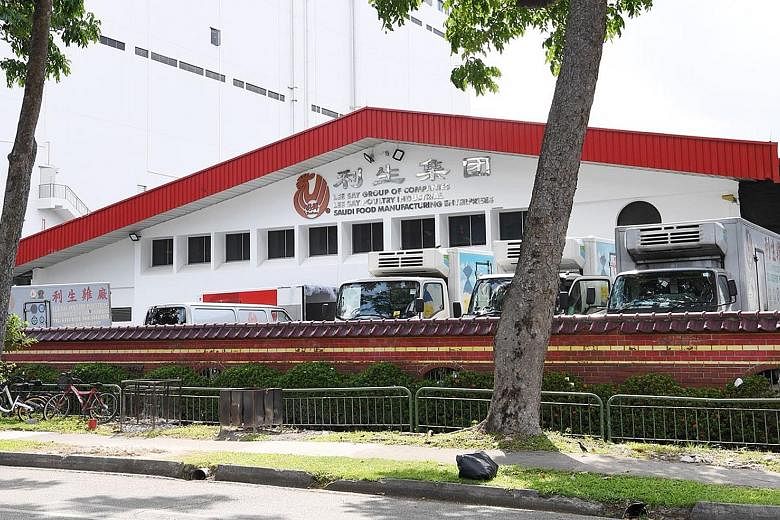After four years of investigations, 13 fresh chicken distributors, which supply more than 90 per cent of fresh chicken products here, have been fined a record $26.9 million for price fixing and non-compete agreements.
The amount is the highest total financial penalty meted out by the Competition and Consumer Commission of Singapore (CCCS) in a single case to date, it said, in issuing its infringement decision yesterday.
Between 2007 and 2014, the suppliers met to discuss prices, and coordinated the amount and timing of increases on at least seven separate occasions, increasing prices by 10 cents to 30 cents a kilogram each time. They also agreed not to compete for one another's customers.
The actions restricted market competition and customer choices, and likely contributed to price increases of certain fresh chicken products in Singapore, the commission said.
Distributors import live chickens from farms in Malaysia and slaughter them here for sale at restaurants, supermarkets, hotels, wet market stalls and hawker stalls.
Products sold include whole fresh chickens, chicken parts and processed chicken.
-
Anti-competitive rulings
-
Past cases
2009: Sixteen coach companies were fined a total of $1.69 million for fixing the price of bus services between Singapore and destinations in Malaysia from 2006 to 2008. Six of the companies succeeded in their appeals to reduce their fines in 2011.
2010: Sistic was fined $769,000 for abusing its dominant market power through its exclusive arrangements. Tickets for shows held at the Esplanade and the Singapore Indoor Stadium, as well as 17 other event promoters had to be sold on Sistic, which was said to be anti-competitive.
2018: Four electronics firms were fined a total of $19.5 million in January for fixing the price of electrical components for more than a decade. Along with Panasonic, who escaped the fine as it had applied for immunity under a leniency programme, the firms engaged in price fixing for aluminium electrolytic capacitors that are used in computers and home appliances.
Ongoing casesGrab-Uber: In July, the Competition and Consumer Commission of Singapore (CCCS) ruled that ride-hailing firm Grab's acquisition of American rival Uber's South-east Asian business breaches competition laws. CCCS has since proposed remedial measures, including fines on both players.
Hotels: In August, CCCS found that the owners and operators of four hotels were found exchanging commercially sensitive information. The four hotels are Capri by Fraser Changi City Singapore, Village Hotel Changi, Village Hotel Katong and Crowne Plaza Changi Airport Hotel. The hotels were given six weeks to make their representations to CCCS before a final decision is taken.
Chicken is the most consumed meat in Singapore, with more than 30kg consumed per person annually, compared with 1kg to 20kg for other meat such as fish, pork, beef and mutton. In 2016, about 49 million chickens were slaughtered here.
Given the high consumption of chicken here and combined market share of the firms, a large number of the suppliers' customers and end-consumers were affected, the commission said.
Investigations began in 2014, following a tip-off, and the CCCS issued a proposed infringement decision against the 13 suppliers in 2016.
They are: Gold Chic Poultry Supply; its related company Hua Kun Food Industry; Hy-fresh Industries; Kee Song Food Corp (formerly Kee Song Brothers Poultry Industries); Ng Ai Food Industries (formerly Ng Ai Muslim Poultry Industries); Sinmah Poultry Processing; Toh Thye San Farm; Lee Say Group's Lee Say Poultry Industrial, Hup Heng Poultry Industries, Prestige Fortune, and Leong Hup Food (formerly KSB Distribution) and its holding company ES Food International; and Tong Huat Group's Tong Huat Poultry Processing Factory and Ban Hong Poultry.
The commission said the total turnover of the suppliers is about half a billion dollars a year.
It conducted further investigations after new evidence came to light, prompting four firms - Tong Huat Group, Sinmah, Kee Song and Hy-fresh - to apply for lenient treatment, the commission said in December last year.
Under the CCCS' Leniency Programme, parties that provide information on their cartel activities can be granted immunity or have their fines cut by up to 100 per cent.
The highest fine of $11,399,041 went to Lee Say Group, which has four firms under it, followed by Tong Huat Group, which was fined $3,580,415, and Kee Song Food Corp, with a $2,689,065 fine.
The commission said it arrived at the amount of fines after considering the turnover of the companies, the nature, duration and seriousness of the infringement, and aggravating and mitigating factors.
The record financial penalty was imposed given the large size of the industry, the high market share of the companies, and the seriousness and long duration of the cartel conduct.
Apart from financial penalties, the firms have also been directed to provide a written undertaking to refrain from using the Poultry Merchants' Association, of which they are all members, or any other industry association, as a platform or front for anti-competitive activities.
The firms were found to have met as early as 2000 to discuss prices at places including the association's headquarters, though evidence of coordinated anti-competitive efforts dated from September 2007.
The whistle-blower will receive a sum of money under the CCCS' reward scheme, where a monetary reward may be paid for information that leads to infringement decisions against cartel members.
"Price fixing and market sharing are considered some of the most harmful types of anti-competitive conduct," said CCCS chief executive Toh Han Li. "Such conduct is particularly harmful when the products are widely consumed in Singapore, such as in this case."


